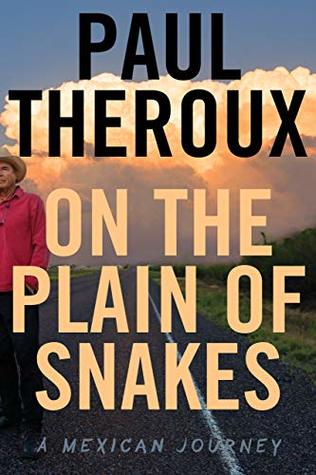More on this book
Community
Kindle Notes & Highlights
Whatever his destination, he was on a rough road.
Mexican youths are required by custom to surrender their seat to anyone older. They know the saying: Más sabe el diablo por viejo, que por diablo—The devil is wise because he’s old, not because he’s the devil. But “Stand aside, old man, and make way for the young” is the American way.
“I have been to a place where none of you have ever been, where none of you can ever go. It is the past. I spent decades there and I can say, you don’t have the slightest idea.”
Most of the time Mexicans use the word “gringo” without much malice. (Gabacho is the insulting word in Mexico for gringo;
And there was my anxiety that my driving days are numbered, that my writing life had stalled, that I kept being reminded I was old, and I knew that a road trip would lift my spirits and release me from the useless obsession of self-scrutiny and induce in me (as the English writer Henry Green put it in Pack My Bag) “that blessed state when you forever cease to give a damn.”
I treasure border crossings, and the best of them are the ones where I’ve had to walk from one country to another, savoring the equality of being a pedestrian, stepping over the theoretical line that is shown on maps, from Cambodia into Vietnam, from Pakistan into India, from Turkey into the Republic of Georgia.
Reflecting on Lopez’s mood, it struck me that the experience of living under a corrupt government and trying to stay honest yourself made people cynical and distrustful of authority, but at the same time self-sufficient and dependent on friends and family, because no one else would help you.
You don’t need to be in Mexico long to understand that it is a country of obstacles, a culture of inconvenience.
But in a poor country, people value what little they have: their dignity, their lives, their children most of all—and their long memories. Their memories are merciless.
Mexicans spend very little time railing against the US government, because in their experience, government by its very nature is corrupt, often criminal, and the poor are its victims.
And I was overcome with sadness, the melancholy of the voyeuristic traveler, and thought: This is what happens when you stay too long in a place. You begin to understand how trapped people feel, how hopeless and beneath notice, how nothing will change for them, while you the traveler simply skip away.
The best botanical gardens are the oldest ones, with majestic trees like Kew or the one in Singapore, or in Calcutta with its great stands of bamboo, or the oldest of all, the garden in Kingstown, on the island of St. Vincent.
“It’s a strange and insufferable uncertainty to know that monumental beauty always supposes servitude,” Albert Camus wrote in the last volume of his Notebooks (1951–1959), speaking of the forced labor that creates great buildings like this. (He was in Rome when this idea came to him.) “Perhaps it’s for this that I put the beauty of a landscape above all else—it’s not paid for by any injustice and my heart is free there.”
But it was not a Mexican intellectual who summed up for me the ambiguities in the Mexican relationship to death. It was Muriel Spark, in her novel Memento Mori: “If I had my life over again I should form the habit of nightly composing myself to thoughts of death. I would practice, as it were, the remembrance of death. There is no other practice which so intensifies life. Death, when it approaches, ought not to take one by surprise. It should be part of the full expectancy of life. Without an ever-present sense of death life is insipid.”
I believe in every possible manifestation of spiritual strangeness. I believe in all possible escapes. The only thing I cannot endure is reality, whatever it may be. I believe that the writer is defined by the constant necessity of creating a world, to depart from this world. Literature is more concerned with misery than with happiness. Writing is directly related to frustration. It is a reflection of personal desperation. The writer is profoundly disgusted with his reality.”
Hamlet and Macbeth, he added, were essential studies in power.
After repeated visits to Africa over fifty years, I concluded that foreign aid as it is conventionally practiced is essentially a failure, futile in relieving poverty, and often harmful, relieving the ills of a few at the expense of the many. Most charities are diabolically self-interested, proselytizing evangelists, tax-avoidance scammers with schemes to buff up the image of the founder—often someone in disgrace or mired in scandal or obscenely rich. Claiming to be apolitical, such charities allow authoritarian governments and kleptocracies to go on existing, because the charities do the
...more
“We consider the struggle of the Basque people for sovereignty just and legitimate, but neither this noble cause, nor any other, can justify the sacrifice of civilian lives. Not only does it not lead to any political gain, even if it did, the human cost is unpayable. We condemn military actions that hurt civilians. And we condemn them equally, whether they come from ETA [Basque nationalists] or from the Spanish state, from Al Qaeda or George W. Bush, from Israelis or Palestinians, or anyone who under different names or initials, claiming state, ideological or religious reasons, makes victims
...more
Not soon, as late as the approach of my ninetieth year I felt a door opening in me and I entered the clarity of early morning.


